2020 湖北考研英语一真题及答案
【完形】
Directions: Read the following text. Choose the best word (s) for each numbered blank
and mark A, B, C or D on the ANSWER SHEET. (10 points)
Even if families don't sit down to eat together as frequently as before, millions
of Britons will nonetheless have got a share this weekend of one of that nation's
great traditions: the Sunday roast. 1 a cold winter's day, few culinary pleasures
can 2 it. Yet as we report now. The food police are determined our health. That this
3 should be rendered yet another quilty pleasure 4 to damage our health.
The Food Standards Authority (FSA) has 5 a public worming about the risks of a
compound called acrylamide that forms in some foods cooked 6 high temperatures. This
means that people should 7 crisping their roast potatoes, reject thin -crust pizzas
and only 8 toast their bread. But where is the evidence to support such adarmlist
advice? 9 studies have shown that acrylamide can cause neurological damage in mice,
there is no 10 evidence that it causes cancer in humans.
Scientists say the compound is 11 to cause cancer but have no hard scientific proof
12 the precautionary principle it could be argued that it is 13 to follow the FSA
advice. 14 it was rumourded that smoking caused cancer for years before the evidence
was found to prove a 15
Doubtless a piece of boiled feef can always be 16 up on Sunday alongside some steamed
vegetables, without the York shire pudding and no wine. But would life be worth living?
17 ,the FSA says it is not telling people to cut out roast foods 18 , but reduce
their lifetime intake.However its 19 risks coming a cross as being pushy and
overprotective. Constant health scares just 20 with no one listening.
1. [A]In [B]Towards [C]on [D]Till
2. [A ]match [B]express [C]satisfy [D]influence
3.[A]patience [B]enjoyment [C]surprise [D]concem
4.[A]intensified [B]privileged [C] compelled [D]guaranteed
5. [A]issued [B]received [C]ignored [D]cancelled
6. [A] under [B]at [C]for [D]by
�
7. [A]forget [B]regret [C]finish [D] avoid
8. [A]partially [B]regularly [C] easily [D]initially
9. [A]Unless [B]Since [C]If [D]While
10.[A] secondary [B]extermal [C] conclusive [D] negative
11.[A]insufficient [B]bound [C]likely [D]slow
12.[A]On the basis of [B]At the cost of [C] In addition to [D]In contrast to
13.[A]interesting [B]advisable [C]urgent [D]fortunate
14.[A]As usual [B]In particular [C]By definition [D]After all
15.[A]resemblance [B]combination [C] connection [D]pattern
16.[A]made [B]served [C]saved [D]used
17.[A]To be fair [B]For instance [C]To be brief [D]In general
18.[A]reluctantly [B]entirely [C] gradually [D] carefully
19.[A] promise [B] experience [C]campaign [D] competition
20.[A]follow up [B]pick up [C] open up [D]end up
答案(1-20)
1. on
2. match
3. enjoyment
4. intensified
5. issued
6. at
7. avoid
�
8. easily
9. while
10. conclusive
11. bound
12. on the basis of
13. advisable
14. after all
15. connection
16. served
17. to be fair
18. entirely
19. campaign
20. end up
【阅读】
Section III Reading Comprehension
Part A Directions: Read the following four texts. Answer the questions below each
text by choosing A, B, C or D. Mark your answers on the ANSWER SHEET. (40 points)
Text 1
A group of labour MPs, among them Yvette Cooper, are bringing in the new year with
a call to institute a UK "town of culture" award. The proposal is that it should
sit alongside the existing city of culture title, which was held by Hull in 2017
and has been awarded to Coventry for Zozl. Cooper and her colleagues argue that the
success of the crown for Hull, where it brought in220m of investment and an avalache
of arts, out not to be confined to cities.Britain' town, it is true are not prevented
from applying, but they generally lack the resources to put together a bit to beat
their bigger competitions. A town of culture award could, it is argued, become an
annual event, attracting funding and creating jobs.
�
Some might see the proposal as a boo by prize for the fact that Britain is no longer
be able to apply for the much more prestigious title of European capital of culture,
a sought-after award bagged by Glasgow in 1990 and Livorpool in 2008. "A cynic might
speculate that the UK is on the verge of disappearing into an endless fever of
self-celebration in its desperation to reinvent itself for the post-Brexit world:
after town of culture, who knows that will follow-village of culture? Suburb of
culture? Hamlet of culture?
It is also wise to recall that such titles are not a cure-all. A badly run "year
of culture"washes in and out of a place like the tide, bringing prominence for a
spell but leaving no lasting benefits to the community. The really successful holders
of such titles are those that do a great deal more than fill hotel bedrooms and bring
in high-profile arts events and good press for a year. They transform the aspirations
of the people who live there; they nudge the self-image of the city into a bolder
and more optimistic light.
It is hard to get right, and requires a remarkable degree of vision, as well as
cooperation between city authorities, the private sector, community groups and
cultural organisations. But it can be done: Glasgow's year as European capital of
culture can certainly be seen as one of complex series of factors that have turned
the city into the power of art, music and theatre that it remains today.
A "town of culture" could be not just about the arts but about honouring a town's
peculiarities-helping sustain its high street, supporting local facilities and
above all celebrating its people and turn it into action.
21. Cooper and her colleagues argue that a "town of culture" award could
[A] consolidate the town-city ties in Britain.
[B] promote cooperation among Britain's towns.
[C] increase the economic strength of Britain's towns.
[D] focus Britain's limited resources on cultural events.
22. According to Paragraph 2, the proposal might be regarded by some as
[A] a sensible compromise.
[B] a self-deceiving attempt.
[C] an eye-cotching bonus.
�
[D] an inaccessible target.
23. The author suggests that a title holder is successful only if it
[A] endeavours to maintain its image.
[B] meets the aspirations of its people.
[C] brings its local arts to prominence.
[D] commits to its long-term growth.
24. Glasgow is mentioned in Paragraph 3 to present
[A] a contrasting case.
[B] a supporting example.
[C]a background story.
[D] a related topic.
25. What is the author's attitude towards the proposal?
[A] Skeptical
[B] Objective
[C] Favourable
[D] Critical
答案(21-25)
21.D focus Britain's limited resources on cultural events.
22.B a self-deceiving attempt.
23.D commits to its long-term growth.
24.B a supporting example.
25.C Favourable.
�
Text2
Scientific publishing has long been a licence to print money, Scientists need
journals in which to publish their research, so they will supply the articles without
monetary reward. Other scientists perform the specialised work of peer review also
for free, because it is a central element in the acquisition of status and the
production of scientific knowledge.
With the content of papers secured for free, the publisher needs only find a market
for its journal. Until this century, university libraries were not very price
sensitive. Scientific publishers routinely report profit margins approaching 40%
on their operations, at a time when the rest of the publishing industry is in an
existential crisis.
The Dutch giant Elsevier, which claims to publish 25% of the scientific papers
produced in the world, made profits of more than f 900m last year, while UK
universities alone spent more than f 210m in 2016 to enable researchers to access
their own publicly funded research;both figures seem to rise unstoppably despite
increasingly desperate efforts to change them.The most drastic, and thoroughly
illegal, reaction has been the emergence of Sci-Hub, a kind of global photocopier
for scientific papers, set up in 2012, which now claims to offer access to every
pay walled article published since 2015. The success of Sci-Hub, which relies on
researchers passing on copies they have themselves legally accessed, shows the legal
ecosystem has lost legitimacy among its users and must be transformed so that it
works for all participants.
In Britain the move towards open access publishing has been driven by funding
bodies.In some ways it has been very successful. More than half of all British
scientific research is now published under open access terms; either freely
available from the moment of publication,or pay walled for a year or more so that
the publishers can make a profit before being placed on general release.
Yet the new system has not worked out any cheaper for the universities. Publishers
have responded to the demand that they make their product free to readers by charging
their writers fees to cover the costs of preparing an article. These range from
around500 to $5,000.A report last year pointed out that the costs both of
subscriptions and of these "article preparation costs" had been steadily rising at
a rate above inflation.
In some ways the scientific publishing model resembles the economy of the social
internet:labour is provided free in exchange for the hope of status, while huge
profits are made by a few big firms who run the market places. In both cases, we
need a rebalancing of power.
�
26. Scientific publishing is seen as "a licence to print money" partly because
[A] its funding has enjoyed a steady increase.
[B] its marketing strategy has been successful.
[C] its payment for peer review is reduced.
[D] its content acquisition costs nothing.!
27. According to Paragraphs 2 and 3, scientific publishers Elsevier have
[A] thrived mainly on university libraries.
[B] gone through an existential crisis.
[C] revived the publishing industry.
[D] financed researchers generously.
28. How does the author feel about the success of Sci-Hub? [A] Relieved.
[B] Puzzled.
[C] Concerned.
[D] Encouraged.
29. It can be learned from Paragraphs 5 and 6 that open access terms
[A] allow publishers some room to make money.
[B] render publishing much easier for scientists.
[C] reduce the cost of publication substantially.
[D] free universities from financial burdens.
30. Which of the following characterises the scientific publishing model?
[A] Trial subscription is offered.
[B] Labour triumphs over status.
�
[C]Costs are well controlled.
[D] The few feed on the many.
答案(26-30)
26.D its content acquisition costs nothing.
27.A thrived mainly on university libraries.
28.D Encouraged.
29.A allow publishers some room to make money.
30.D The few feed on the many.
Text 3
Progressives often support diversity mandates as a path to equality and a way to
level the playing field. But all too often such policies are an insincere form of
virtue-signaling that benefits only the most privileged and does little to help
average people.
A pair of bills sponsored by Massachusetts state Senator Jason Lewis and House
Speaker Pro Tempore Patricia Haddad, to ensure "gender parity" on boards and
commissions, provide a case in point.
Haddad and Lewis are concerned that more than half the state-government board are
lessthan40 percent female. In order to ensure that elite women have more such
opportunities, they have proposed imposing government quotas. If the bills become
law, state boards and commissions will be required to set aside 50 percent of board
seats for women by 2022.
The bills are similar to a measure recently adopted in Califomia, which last year
became the first state to require gender quotas for private companies. In signing
the measure, California Governor Jerry Brown admitted that the law, which expressly
classifies people on the basis of sex, is probably unconstitutional.
The US Supreme Court frowns on sex based classifications unless they are designed
to address an "important" policy interest, Because the California law applies to
all boards, even where there is no history of prior discrimination, courts are likely
to rule that the law violates the constitutional guarantee of "equal protection".
�


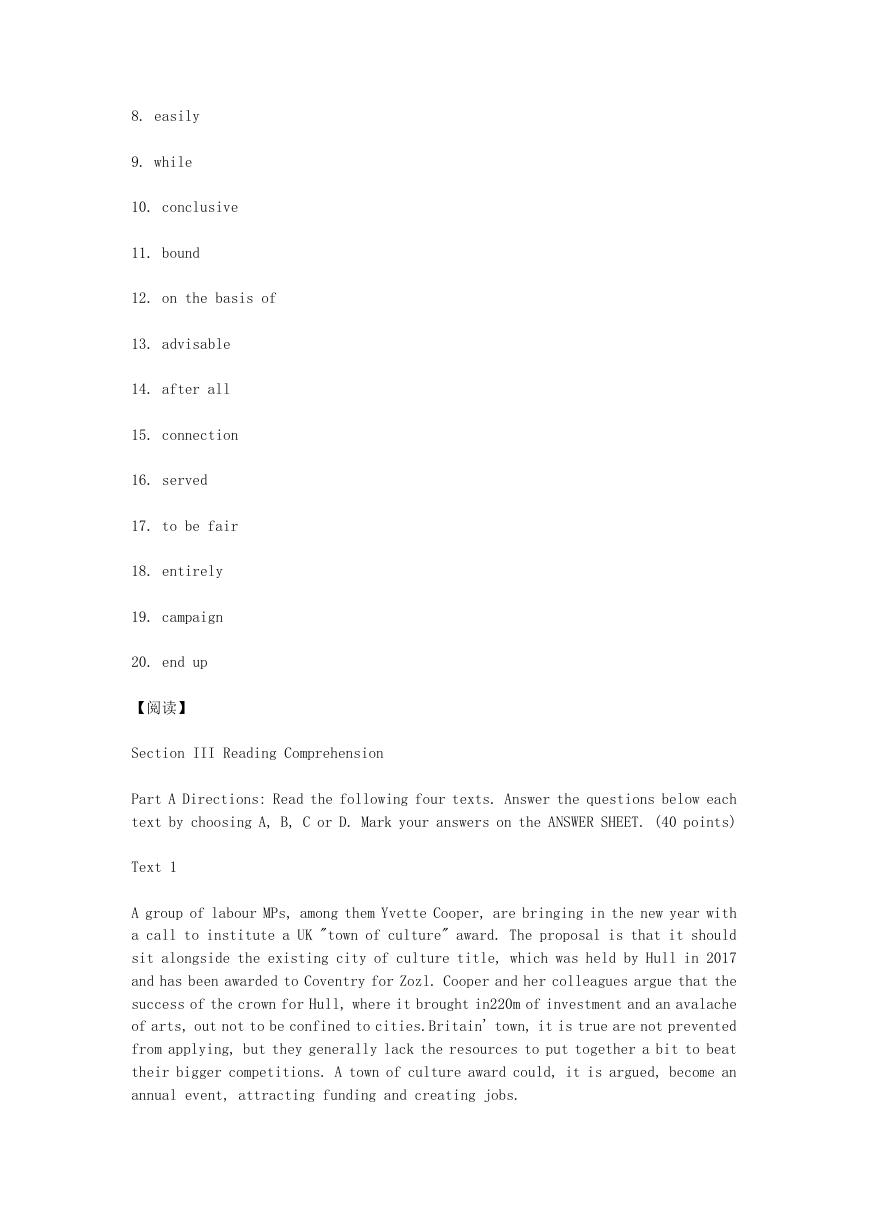
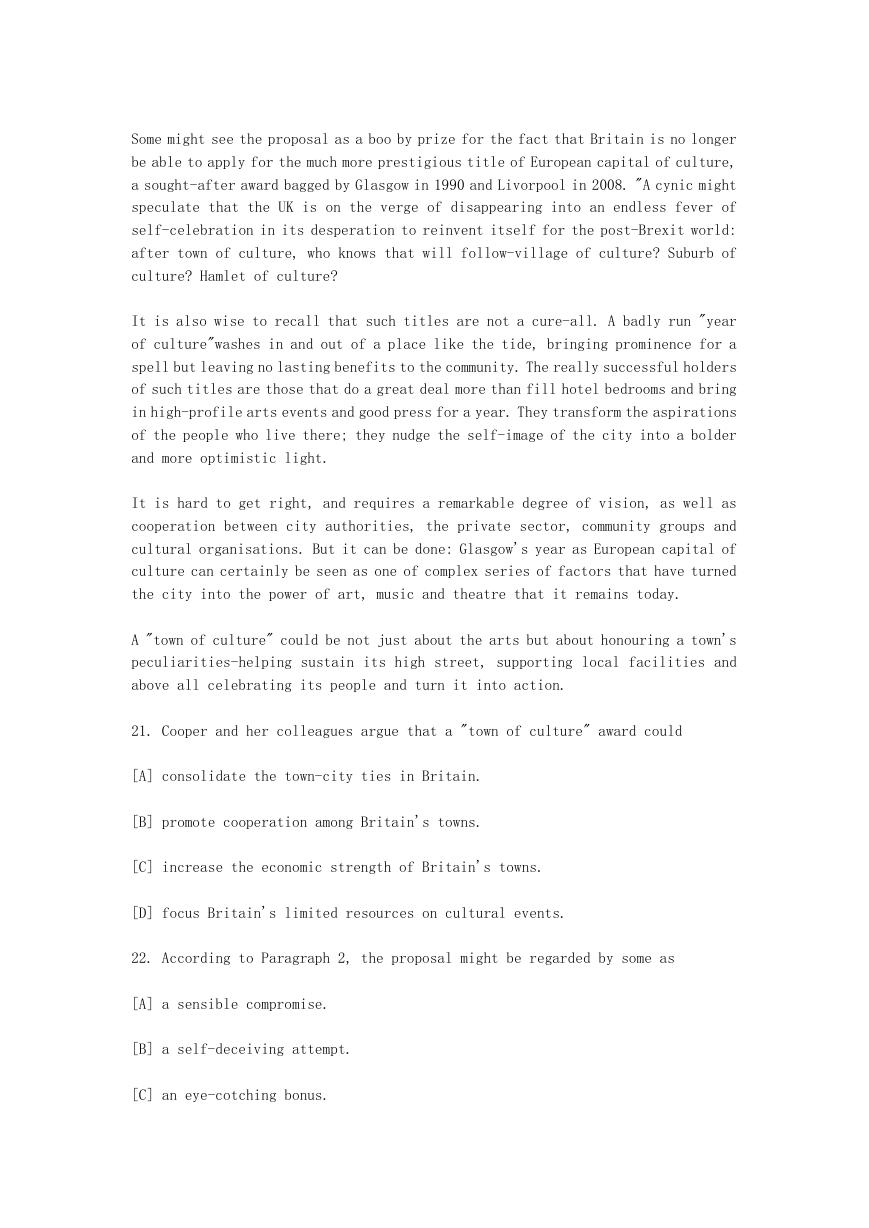
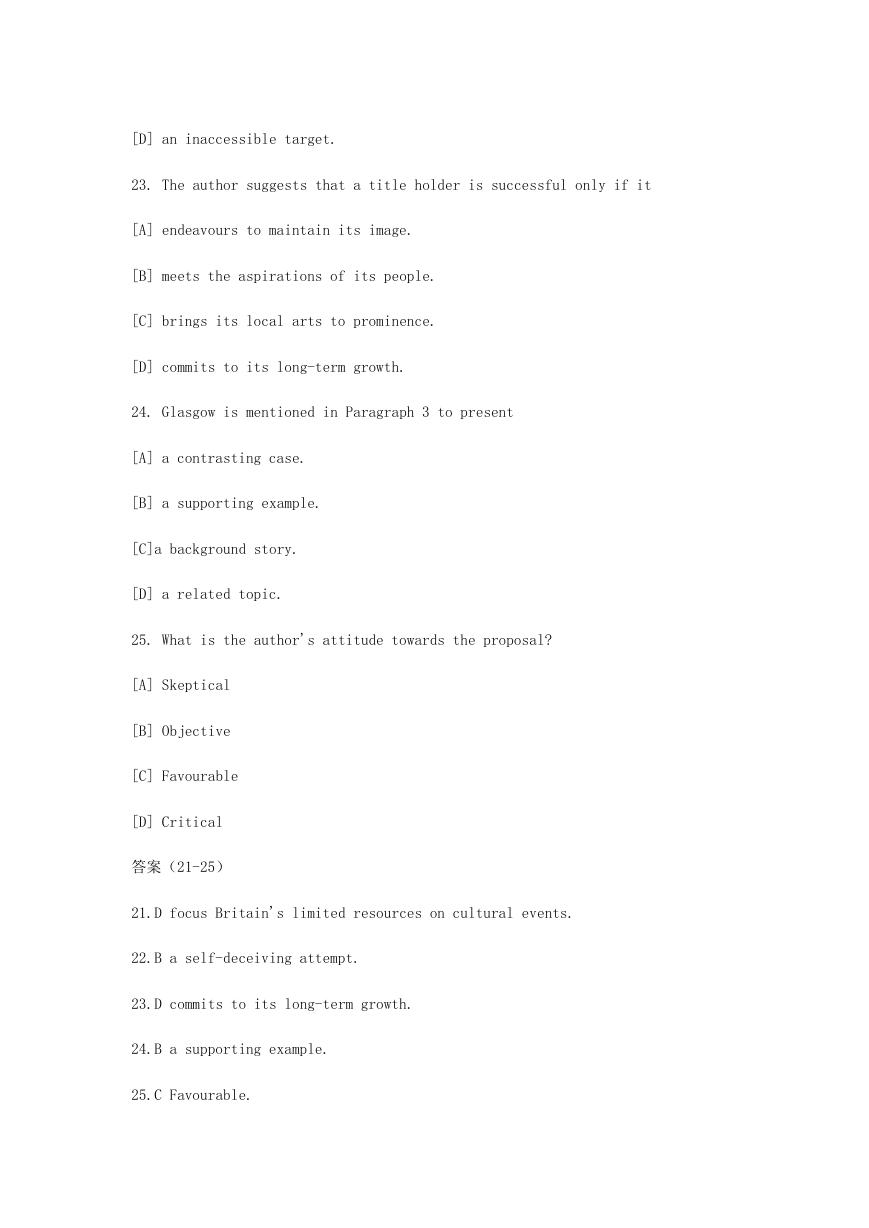
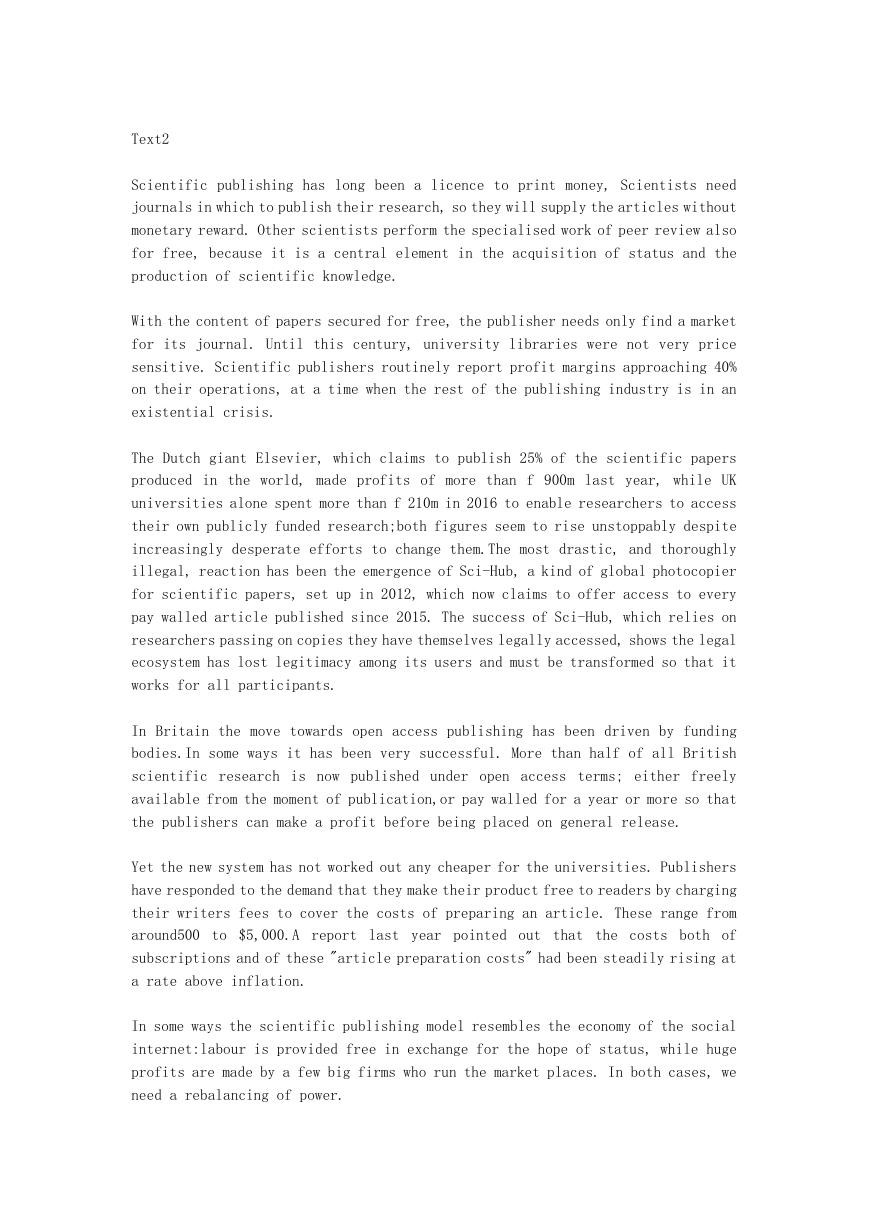
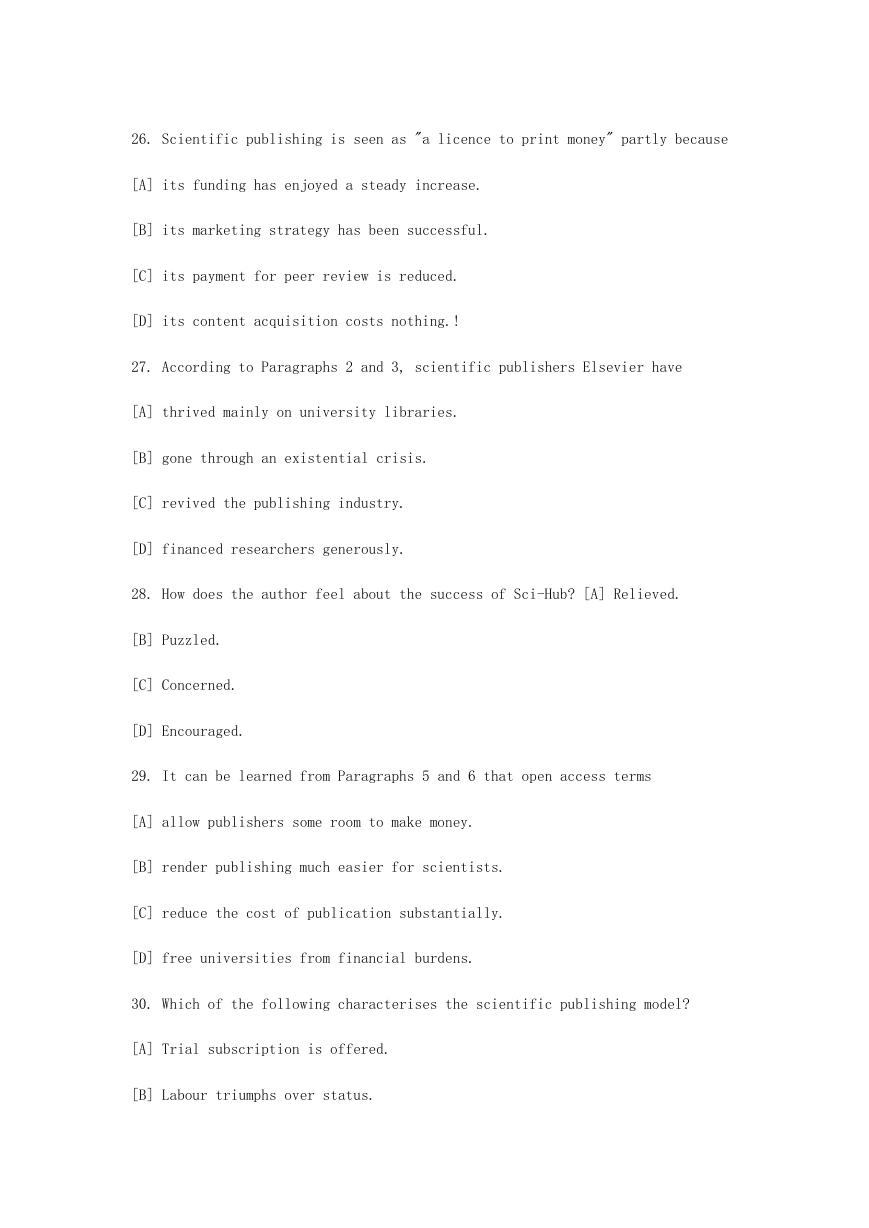
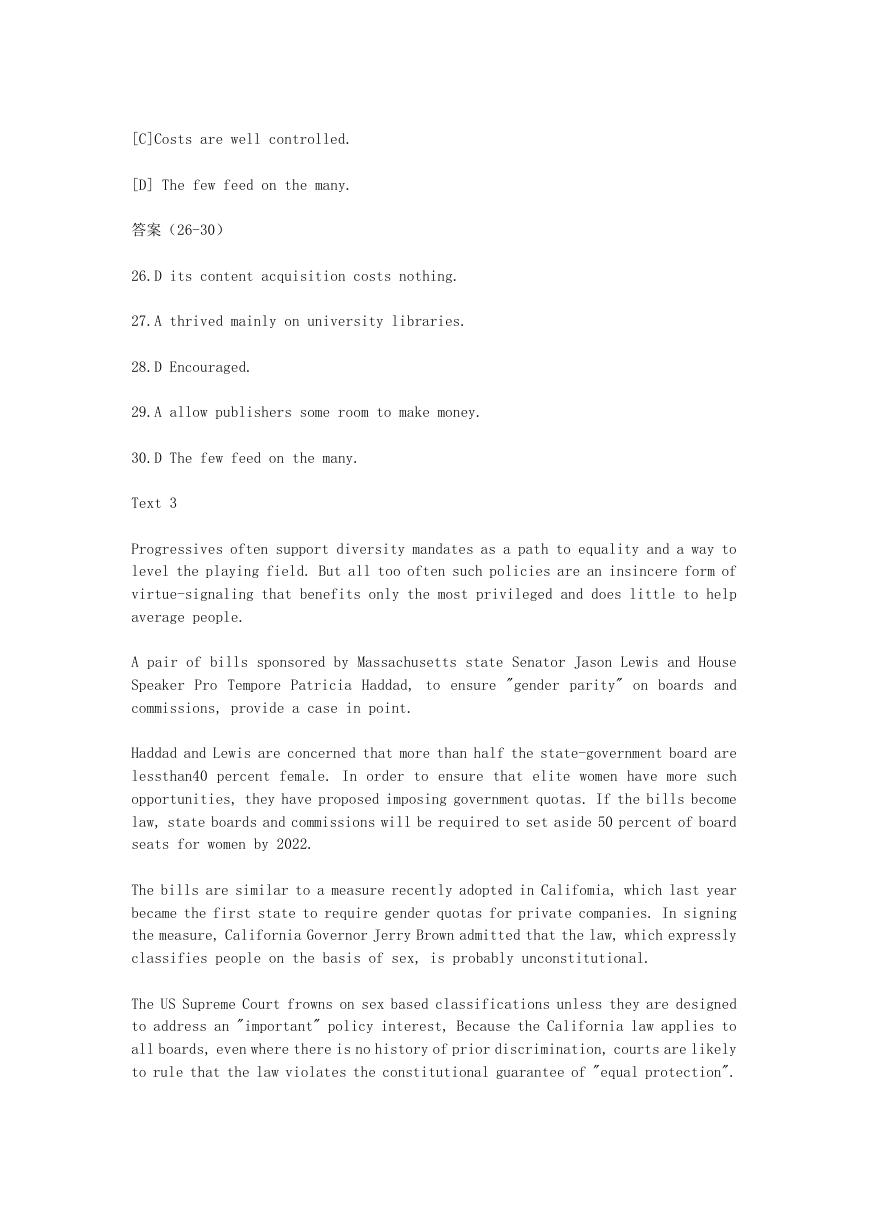








 2023年江西萍乡中考道德与法治真题及答案.doc
2023年江西萍乡中考道德与法治真题及答案.doc 2012年重庆南川中考生物真题及答案.doc
2012年重庆南川中考生物真题及答案.doc 2013年江西师范大学地理学综合及文艺理论基础考研真题.doc
2013年江西师范大学地理学综合及文艺理论基础考研真题.doc 2020年四川甘孜小升初语文真题及答案I卷.doc
2020年四川甘孜小升初语文真题及答案I卷.doc 2020年注册岩土工程师专业基础考试真题及答案.doc
2020年注册岩土工程师专业基础考试真题及答案.doc 2023-2024学年福建省厦门市九年级上学期数学月考试题及答案.doc
2023-2024学年福建省厦门市九年级上学期数学月考试题及答案.doc 2021-2022学年辽宁省沈阳市大东区九年级上学期语文期末试题及答案.doc
2021-2022学年辽宁省沈阳市大东区九年级上学期语文期末试题及答案.doc 2022-2023学年北京东城区初三第一学期物理期末试卷及答案.doc
2022-2023学年北京东城区初三第一学期物理期末试卷及答案.doc 2018上半年江西教师资格初中地理学科知识与教学能力真题及答案.doc
2018上半年江西教师资格初中地理学科知识与教学能力真题及答案.doc 2012年河北国家公务员申论考试真题及答案-省级.doc
2012年河北国家公务员申论考试真题及答案-省级.doc 2020-2021学年江苏省扬州市江都区邵樊片九年级上学期数学第一次质量检测试题及答案.doc
2020-2021学年江苏省扬州市江都区邵樊片九年级上学期数学第一次质量检测试题及答案.doc 2022下半年黑龙江教师资格证中学综合素质真题及答案.doc
2022下半年黑龙江教师资格证中学综合素质真题及答案.doc